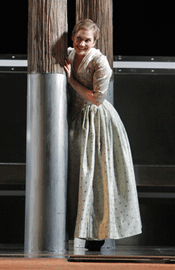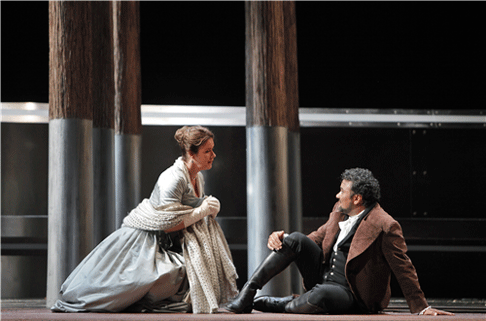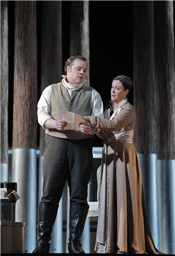![Alice Coote as Charlotte [Photo by Cory Weaver courtesy of San Francisco Opera]](http://www.operatoday.com/Coote_Charlotte_SFO.gif)
24 Sep 2010
Werther in San Francisco
It has been twenty-five years since San Francisco Opera has staged a Werther. so it was high time that Massenet’s whiney, weepy masterpiece be given another chance.
English Touring Opera are delighted to announce a season of lyric monodramas to tour nationally from October to December. The season features music for solo singer and piano by Argento, Britten, Tippett and Shostakovich with a bold and inventive approach to making opera during social distancing.
This tenth of ten Live from London concerts was in fact a recorded live performance from California. It was no less enjoyable for that, and it was also uplifting to learn that this wasn’t in fact the ‘last’ LfL event that we will be able to enjoy, courtesy of VOCES8 and their fellow vocal ensembles (more below …).
Ever since Wigmore Hall announced their superb series of autumn concerts, all streamed live and available free of charge, I’d been looking forward to this song recital by Ian Bostridge and Imogen Cooper.
The Sixteen continues its exploration of Henry Purcell’s Welcome Songs for Charles II. As with Robert King’s pioneering Purcell series begun over thirty years ago for Hyperion, Harry Christophers is recording two Welcome Songs per disc.
Although Stile Antico’s programme article for their Live from London recital introduced their selection from the many treasures of the English Renaissance in the context of the theological debates and upheavals of the Tudor and Elizabethan years, their performance was more evocative of private chamber music than of public liturgy.
In February this year, Albanian soprano Ermonela Jaho made a highly lauded debut recital at Wigmore Hall - a concert which both celebrated Opera Rara’s 50th anniversary and honoured the career of the Italian soprano Rosina Storchio (1872-1945), the star of verismo who created the title roles in Leoncavallo’s La bohème and Zazà, Mascagni’s Lodoletta and Puccini’s Madama Butterfly.
Evidently, face masks don’t stifle appreciative “Bravo!”s. And, reducing audience numbers doesn’t lower the volume of such acclamations. For, the audience at Wigmore Hall gave soprano Elizabeth Llewellyn and pianist Simon Lepper a greatly deserved warm reception and hearty response following this lunchtime recital of late-Romantic song.
Collapsology. Or, perhaps we should use the French word ‘Collapsologie’ because this is a transdisciplinary idea pretty much advocated by a series of French theorists - and apparently, mostly French theorists. It in essence focuses on the imminent collapse of modern society and all its layers - a series of escalating crises on a global scale: environmental, economic, geopolitical, governmental; the list is extensive.
For this week’s Live from London vocal recital we moved from the home of VOCES8, St Anne and St Agnes in the City of London, to Kings Place, where The Sixteen - who have been associate artists at the venue for some time - presented a programme of music and words bound together by the theme of ‘reflection’.
'Such is your divine Disposation that both you excellently understand, and royally entertaine the Exercise of Musicke.’
Amongst an avalanche of new Mahler recordings appearing at the moment (Das Lied von der Erde seems to be the most favoured, with three) this 1991 Mahler Second from the 2nd Kassel MahlerFest is one of the more interesting releases.
‘And there was war in heaven: Michael and his angels fought against the dragon; and the dragon fought and his angels, And prevailed not; neither was their place found any more in heaven … that old serpent … Satan, which deceiveth the whole world: he was cast out into the earth, and his angels were cast out with him.’
If there is one myth, it seems believed by some people today, that probably needs shattering it is that post-war recordings or performances of Wagner operas were always of exceptional quality. This 1949 Hamburg Tristan und Isolde is one of those recordings - though quite who is to blame for its many problems takes quite some unearthing.
There was never any doubt that the fifth of the twelve Met Stars Live in Concert broadcasts was going to be a palpably intense and vivid event, as well as a musically stunning and theatrically enervating experience.
‘Love’ was the theme for this Live from London performance by Apollo5. Given the complexity and diversity of that human emotion, and Apollo5’s reputation for versatility and diverse repertoire, ranging from Renaissance choral music to jazz, from contemporary classical works to popular song, it was no surprise that their programme spanned 500 years and several musical styles.
The Academy of St Martin in the Fields have titled their autumn series of eight concerts - which are taking place at 5pm and 7.30pm on two Saturdays each month at their home venue in Trafalgar Square, and being filmed for streaming the following Thursday - ‘re:connect’.
The London Symphony Orchestra opened their Autumn 2020 season with a homage to Oliver Knussen, who died at the age of 66 in July 2018. The programme traced a national musical lineage through the twentieth century, from Britten to Knussen, on to Mark-Anthony Turnage, and entwining the LSO and Rattle too.
With the Live from London digital vocal festival entering the second half of the series, the festival’s host, VOCES8, returned to their home at St Annes and St Agnes in the City of London to present a sequence of ‘Choral Dances’ - vocal music inspired by dance, embracing diverse genres from the Renaissance madrigal to swing jazz.
Just a few unison string wriggles from the opening of Mozart’s overture to Le nozze di Figaro are enough to make any opera-lover perch on the edge of their seat, in excited anticipation of the drama in music to come, so there could be no other curtain-raiser for this Gala Concert at the Royal Opera House, the latest instalment from ‘their House’ to ‘our houses’.
"Before the ending of the day, creator of all things, we pray that, with your accustomed mercy, you may watch over us."
![Alice Coote as Charlotte [Photo by Cory Weaver courtesy of San Francisco Opera]](http://www.operatoday.com/Coote_Charlotte_SFO.gif)
It has been twenty-five years since San Francisco Opera has staged a Werther. so it was high time that Massenet’s whiney, weepy masterpiece be given another chance.
How it fared in 1985 is an interesting speculation, as its famed Werther, Alfredo Kraus was then 57 years-old and his Charlotte was the famed verismo diva Renata Scotto in decline.
Just now the Werther was entrusted to 50 year-old Ramón Vargas. Just two years ago Mr. Vargas was the perfect embodiment of an adorable Nemorino in the SFO Elisir d’amore. His career however generally has traversed larger lyric tenor roles — Rodolfo, Lenski, Don Carlo, etc. — for which he has perfected the physical delivery. Unfortunately this famous Mexican tenor no longer seems to be able to muster the vocal heft to match the gestures. Lacking now was the sense of vocal push and emotional release that makes a tenor, and therefore Werther exciting.
 Heidi Stober as Sophie
Heidi Stober as Sophie
Likewise his Charlotte, British mezzo Alice Coote gave a problematic performance. She is a lovely artist in prime condition whose fame has accrued primarily in the Baroque repertory. But the studied musicality that made her an ideal Idamante in SFO’s 2008 Idomeneo did not serve her in this foray into the French dramatic mezzo repertory. Unlike Mr. Vargas she has not absorbed the gestures and mannerisms of this repertory, an attribute that this production exploited by inducing too much realistic detail into her acting. Coupled with self-conscious musicality her performance was hard to watch.
Conductor Emmanuel Villaume however supplied everything these artists lacked, and created what was a memorable performance, his orchestra whining and weeping convincingly and crying out in full throat and throttle, his expansive tempos relentlessly driving the despair first of Werther and finally of Charlotte. Massenet’s tear-jerker is replete with much opportunity for the double reeds to freely emote and that the fine players of the San Francisco Opera Orchestra did with abandon.
The flawed performances of the protagonists were overwhelmed indeed by Mo. Villaume’s orchestral outpourings and were exacerbated by the set of this new production that elevated the singers and placed them somewhat behind the proscenium arch, a positioning that proved visually and acoustically remote. [This observation was based on sitting in the eighteenth row. At another, performance seated in the third row, these problems disappeared.]
This brand new production, directed by Francisco Negrin and designed by Louis Désiré, is challenging and interesting, attributes that are rare these days at SFO. The intent of the production was apparently to supply the world in which Werther and Charlotte’s story evolved with the innumerable complexities hinted at in the libretto but not present in Massenet’s score. The practical intent was perhaps to insert action into a libretto of static emotional and dramatic situations.
 Ramón Vargas as Werther and Alice Coote as Charlotte
Ramón Vargas as Werther and Alice Coote as Charlotte
The frenzy of subtext that resulted did not illuminate the simple, direct emotions of the Massenet score but rather created a vibrant ambience for Massenet’s ultimate, over-the-top dénouement. Any attempt at analysis of this imposed subtext seems useless as it hardly matters to the emotional gravity of the story that Sophie is head-over-heels in love with Werther or that Albert reads Werther’s letters alongside Charlotte and lies beside her in the marriage bed while she imagines Werther reciting Ossian. These real and imagined complications were sometimes amusing and other times annoying.
All this was effected in a frenzy of staging clichés — piles of furniture, the doubling of characters by actors, scribbling on a wall, lines of neon light, reflective surfaces, post-modern mix of materials and images, shuttering effects of light and image, not to forget the obligatory use of video. But all were put to good use, and even effective once the irritation of seeing these hackneyed tricks hit the stage once again was forgotten.
 Alice Coote as Charlotte and Brian Mulligan as Albert
Alice Coote as Charlotte and Brian Mulligan as Albert
Of particularly fine effect was the use of actor doubles for the dying Werther (making three of them!) allowing Charlotte to kneel over a splayed Werther while the erect Vargas/Werther held forth pathetically nearby and the third sat motionless facing upstage. Perhaps there was even a fourth Werther as someone held a torch in upstage blackness all through this long death scene.
It had come as a bit of a surprise when Charlotte donned the black dress in which she emoted over dying Werther — for the first three acts she was kept emotionally aloof and physically far away so it was hard to accept that she suddenly raced to his side.
The set architecture was based on horizontal bands — Werther’s garret on stage level, above that the stage-wide platform on which all life unfolded like on a cinemascope movie screen (even silver hued because of reflective metal walls). And above that floated intermittently a band of photographs of, inexplicably, some old New England houses variously modified from time to time to illustrate mood. A few vertical leafless metallic trees tried to function as an indication of season.
Mr. Vargas and Mme. Coote executed their roles with obvious respect for the production. Baritone Brian Mulligan was directed to an unrelenting oafish presence for Albert that precluded the admittance of any depth to his character. Soprano Heidi Stober brought vitality and vocal brilliance to Sophie in the evening’s only sympathetic performance. The unusually fine supporting cast (the bailiff and his cronies) though too young managed to bring their roles vocally and dramatically alive.
This Werther is co-produced by Lyric Opera of Chicago where presumably it will appear in the 2011-12 season. With another cast it may take on a depth it lacked here in San Francisco.
Michael Milenski